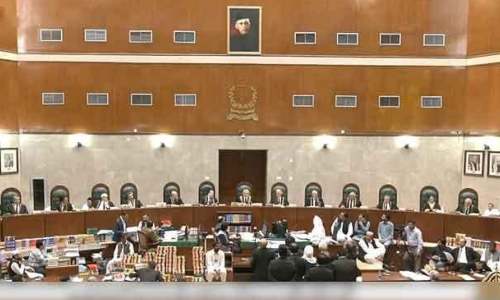ISLAMABAD: For the first time ever, the Supreme Court of Pakistan has allowed live telecast of its proceedings on a set of petitions challenging the Supreme Court (Practice and Procedure) Act 2023. This law was passed by the previous Pakistan Democratic Movement (PDM)-led government to regulate the suo motu powers of the chief justice of Pakistan.
The current hearing on these petitions is being conducted by the newly-appointed Chief Justice, Qaez Faez Isa, and is being televised live on state-owned channel PTV. The apex court has deemed the petitions requesting a full court hearing admissible, with Chief Justice Isa explaining that this decision was made during a full court meeting.
During the hearing, Chief Justice Isa indicated that the arguments in the case would commence anew due to the formation of a new bench. Notably, three applications for a full court hearing were approved.
Before the hearing, the Attorney General for Pakistan, Mansoor Usman Awan, submitted the federal government’s response, urging the court to dismiss the petitions against the Supreme Court Practice and Procedure Act. The government’s response contended that petitions against acts of parliament are inadmissible.
The decision to broadcast the proceedings was reached during a full court meeting before the hearing, with reports confirming the installation of five cameras in courtroom number one, four in the visitors’ gallery, and one for the lawyers’ rostrum in front of the judges’ docks.
The law under scrutiny concerns the powers of the Chief Justice in matters of public interest and seeks to limit the suo motu powers of the top judge in the apex court. On April 13, a bench of eight judges led by the then-Chief Justice Umar Ata Bandial halted the implementation of this law.
The newly-formed full court, headed by Chief Justice Isa, includes several other esteemed justices. Before the case’s hearing, a full court meeting was convened to discuss the live broadcasting of proceedings and establish effective hearing guidelines.
Chief Justice Isa emphasized the importance of maintaining open and accessible doors to justice upon his arrival at the court. In a similar vein, discussions during the previous hearing in June revolved around harmonizing the Supreme Court (Review of Judgments and Orders) Act of 2023 with the SC Practice and Procedure Act. Chief Justice Isa stressed that the federal government should consider the top court’s perspective when crafting legislation pertaining to the judiciary.
As the hearing began, Chief Justice Isa noted the presence of nine applications and asked Advocate Khawaja Tariq Rahim to initiate his arguments. The Chief Justice encouraged Rahim to focus on the Act’s content rather than dwelling on the past.
Justice Ayesha inquired about the impact of Section 5 of the Act, which grants the right of appeal if the law is upheld. Rahim referred to the practice act and mentioned Parliament’s role in legislating matters of public interest.
Justice Mansoor queried the distinction between actions taken by the full court and those undertaken by Parliament. Chief Justice Isa and Justice Mazhar requested Rahim to specify which section of the law the petitioner objected to and which article of the Constitution the act conflicted with.
While many questions concerning the authority of Parliament were raised, Chief Justice Isa urged Rahim to take note of these questions and respond to them later. He also cautioned Rahim against offering personal opinions and emphasized focusing on the law.
Rahim argued that Parliament had interfered with the Supreme Court’s rules, prompting Justice Athar to inquire if Rahim supported past actions. The Chief Justice then asked Rahim whether he believed the entire law was flawed or only certain clauses.
Rahim explained that the Supreme Court’s authority to make rules of practice and procedure was established in Schedule 4 of the Federal Legislative List. Justice Mandokhel sought clarification on whether this authority was derived from the Constitution or specific legislation.
Advocate Rahim stated that he would address these queries at a later time. Justice Athar inquired whether it was within Parliament’s purview to enact this law.
During the hearing, Chief Justice Isa underscored that the court operates on the taxes of the people and expressed his reluctance to hold absolute authority. He emphasized his commitment to upholding the Constitution and the law, emphasizing that judges take an oath to adhere to these principles.
The law in question granted a three-member committee, comprising senior judges and the Chief Justice, the power to take suo motu notice. It aimed to ensure transparency in the apex court’s proceedings and included the right to appeal. Additionally, the Act outlined the constitution of benches and specified procedures for matters invoking the use of Article 184(3) of the Constitution, among other provisions.
(Islamabad51-Newsdesk)














